Impeachment hearings for President Donald Trump come at the very time that Capitol Hill usually tends to its mound of unfinished business.
The hearings and the possibility of impeachment and a trial create yet another layer of complications for senior lawmakers pressing for an agreement on $1.4 trillion worth of federal agency budgets or finalizing a rewrite of the North American trade rules.
Public hearings into Trump's actions with Ukraine promise to suck the air out of Washington and stoke the partisan flames inside the Capitol ever hotter. Yet they could still be the last, best opportunity for lawmakers to wrap up their work on the budget and the trade deal.
As the House returns from a quick break, the sole piece of must-do business is to pass a governmentwide stopgap spending bill to avert the second government shutdown within a year.
Avoiding a shutdown shouldn't be a problem, at least for now, with passage of a temporary, governmentwide spending bill to perhaps Dec. 20 virtually assured. Top leaders on Capitol Hill, however, are struggling with a full-year solution on the appropriations work, where progress is overdue and at least some risk of being derailed entirely remains.
Most notably, a recurring fight over Trump's U.S.-Mexico border fence and immigrant detention practices is making it difficult for House Speaker Nancy Pelosi, D-Calif., and Senate Majority Leader Mitch McConnell, R-Ky., to make progress on a broader, full-year $1.4 trillion spending bill. That measure is needed to implement the terms of last summer's hard-won budget agreement, which distributed budget increases to both the Pentagon and domestic agencies.
McConnell is personally invested in a successful budget outcome and both he and Pelosi have long histories on appropriations. A meeting on Tuesday among the bipartisan leadership of the Appropriations committees could produce an agreement on the stopgap measure — but efforts to smooth agreement on wall funding aren't going nearly as well.
The other top issue is a legislative update to the landmark North American Free Trade Agreement, which is especially sought by Trump's GOP allies and the party's Main Street supporters.
Pelosi is the key figure on trade, which is always a tricky issue for Democrats, even if the politics of the new United States-Mexico-Canada Agreement are nowhere nearly as divisive as NAFTA was 26 years ago.
Passage of NAFTA in 1993 badly split House Democrats, but Pelosi, who represents the Port of San Francisco, voted "aye," as did Majority Leader Steny Hoyer, D-Md., and powerful Ways and Means Committee Chairman Richard Neal, D-Mass.
Neal is leading a working group on the measure and says the group is "on the 5-yard line" and the optimistic take is that he and Pelosi will bring USMCA in for a touchdown.
The trade updates are generally seen as an improvement over NAFTA, whose provisions enforcing Mexican labor and environmental rules are seen as inadequate by many Democrats. The selling points for the new pact are that it updates NAFTA for the 21st century with hard-won provisions on digital trade, intellectual property, financial services and agriculture trade.
Still, any impeachment-related delays could tax patience and thrust politically freighted issues like the border wall and the GOP's top goal of an updated U.S. trade pact with Mexico and Canada directly into the heat of the presidential primary campaign.
On spending, Trump is a wild card as usual. He singlehandedly drove the 35-day partial shutdown that spanned the changeover between GOP and Democratic control of the House last winter. He has struggled to win much wall funding from Congress, where lawmakers in both parties have other designs for the money.
Trump has had more success in exploiting his transfer powers to siphon money from Pentagon anti-drug and military base construction accounts toward the wall, and construction is finally beginning on the new segments he has long promised.
Trump could easily spin a successful wall narrative without much more in new appropriations and simply funding the government on autopilot — though hardly anyone is advocating that — would give him perhaps $6 billion more.
Trump's anger at impeachment, his poisonous relationship with Pelosi, and his unpredictability and volatility are red flags for optimists. But the forces favoring an agreement are powerful, and McConnell — a top force behind the July budget pact — appears ready to get engaged more actively.
The odds for a spending deal could be helped by the apparent sidelining — because of impeachment — of acting White House chief of staff Mick Mulvaney and budget office chief Russell Vought, two hard-liners with whom McConnell has clashed in the past.
And there is still time for action, even if the odds get more dicey in a presidential election year.
One of the benefits of limiting the duration of the upcoming stopgap spending bill, known as a continuing resolution or CR, is that is means another is needed before Congress adjourns for the year.
Any December stopgap measure could also provide a way to ship some unfinished business on taxes, health care and pensions to Trump's desk as part of a must-pass package. Top lawmakers hope that a full-year spending bill would serve the same purpose but acknowledge there are considerable obstacles.
"I think it would be a terrible mistake if we were still in a continuing resolution after the first of the year for a whole host of reasons," said top Senate Appropriations Committee Democrat Patrick Leahy of Vermont, citing shifting signals from the White House as contributing to the delays. "It has been difficult with the White House because ... they have not always been consistent in what they want."
UNITED NATIONS (AP) — The United States vetoed a widely backed U.N. resolution Thursday that would have paved the way for full United Nations membership for Palestine, a goal the Palestinians have long sought and Israel has worked to prevent.
The vote in the 15-member Security Council was 12 in favor, the United States opposed and two abstentions, from the United Kingdom and Switzerland. U.S. allies France, Japan and South Korea supported the resolution.
The strong support the Palestinians received reflects not only the growing number of countries recognizing their statehood but almost certainly the global support for Palestinians facing a humanitarian crisis caused by the war in Gaza, now in its seventh month.
The resolution would have recommended that the 193-member U.N. General Assembly, where there are no vetoes, approve Palestine becoming the 194th member of the United Nations. Some 140 countries have already recognized Palestine, so its admission would have been approved, likely by a much higher number of countries.
U.S. deputy ambassador Robert Wood told the Security Council that the veto “does not reflect opposition to Palestinian statehood but instead is an acknowledgment that it will only come from direct negotiations between the parties."
The United States has “been very clear consistently that premature actions in New York — even with the best intentions — will not achieve statehood for the Palestinian people,” deputy State Department spokesman Vedant Patel said.
His voice breaking at times, Palestinian U.N. Ambassador Riyad Mansour told the council after the vote: “The fact that this resolution did not pass will not break our will and it will not defeat our determination.”
“We will not stop in our effort,” he said. “The state of Palestine is inevitable. It is real. Perhaps they see it as far away, but we see it as near.”
This is the second Palestinian attempt for full membership and comes as the war in Gaza has put the more than 75-year-old Israeli-Palestinian conflict at center stage.
Palestinian President Mahmoud Abbas first delivered the Palestinian Authority’s application for U.N. membership in 2011. It failed because the Palestinians didn’t get the required minimum support of nine of the Security Council’s 15 members.
They went to the General Assembly and succeeded by more than a two-thirds majority in having their status raised from a U.N. observer to a non-member observer state in 2012. That opened the door for the Palestinian territories to join U.N. and other international organizations, including the International Criminal Court.
Algerian U.N. Ambassador Amar Bendjama, the Arab representative on the council who introduced the resolution, called Palestine’s admission “a critical step toward rectifying a longstanding injustice" and said that “peace will come from Palestine’s inclusion, not from its exclusion.”
In explaining the U.S. veto, Wood said there are “unresolved questions” on whether Palestine meets the criteria to be considered a state. He pointed to Hamas still exerting power and influence in the Gaza Strip, which is a key part of the state envisioned by the Palestinians.
Wood stressed that the U.S. commitment to a two-state solution, where Israel and Palestine live side-by-side in peace, is the only path for security for both sides and for Israel to establish relations with all its Arab neighbors, including Saudi Arabia.
“The United States is committed to intensifying its engagement with the Palestinians and the rest of the region, not only to address the current crisis in Gaza, but to advance a political settlement that will create a path to Palestinian statehood and membership in the United Nations,” he said.
Mansour, the Palestinian U.N. ambassador, reiterated the commitment to a two-state solution but asserted that Israel believes Palestine "is a permanent strategic threat."
"Israel will do its best to block the sovereignty of a Palestinian state and to make sure that the Palestinian people are exiled away from their homeland or remain under its occupation forever,” he said.
He demanded of the council and diplomats crowded in the chamber: “What will the international community do? What will you do?”
Israeli-Palestinian negotiations have been stalled for years, and Israel’s right-wing government is dominated by hard-liners who oppose Palestinian statehood.
Israeli U.N. Ambassador Gilad Erdan called the resolution “disconnected to the reality on the ground” and warned that it “will cause only destruction for years to come and harm any chance for future dialogue.”
Six months after the Oct. 7 attack by the Hamas militant group, which controlled Gaza, and the killing of 1,200 people in “the most brutal massacre of Jews since the Holocaust,” he accused the Security Council of seeking “to reward the perpetrators of these atrocities with statehood.”
Israel’s military offensive in response has killed over 32,000 Palestinians, according to Gaza’s health ministry, and destroyed much of the territory, which speaker after speaker denounced Thursday.
After the vote, Erdan thanked the United States and particularly President Joe Biden “for standing up for truth and morality in the face of hypocrisy and politics.”
He called the Palestinian Authority — which controls the West Bank and the U.S. wants to see take over Gaza where Hamas still has sway — “a terror supporting entity.”
The Israeli U.N. ambassador referred to the requirements for U.N. membership – accepting the obligations in the U.N. Charter and being a “peace-loving” state.
“How can you say seriously that the Palestinians are peace loving? How?” Erdan asked. “The Palestinians are paying terrorists, paying them to slaughter us. None of their leaders condemns terrorism, nor the Oct. 7 massacre. They call Hamas their brothers.”
Despite the Palestinian failure to meet the criteria for U.N. membership, Erdan said most council members supported it.
“It’s very sad because your vote will only embolden Palestinian rejectionism every more and make peace almost impossible,” he said.
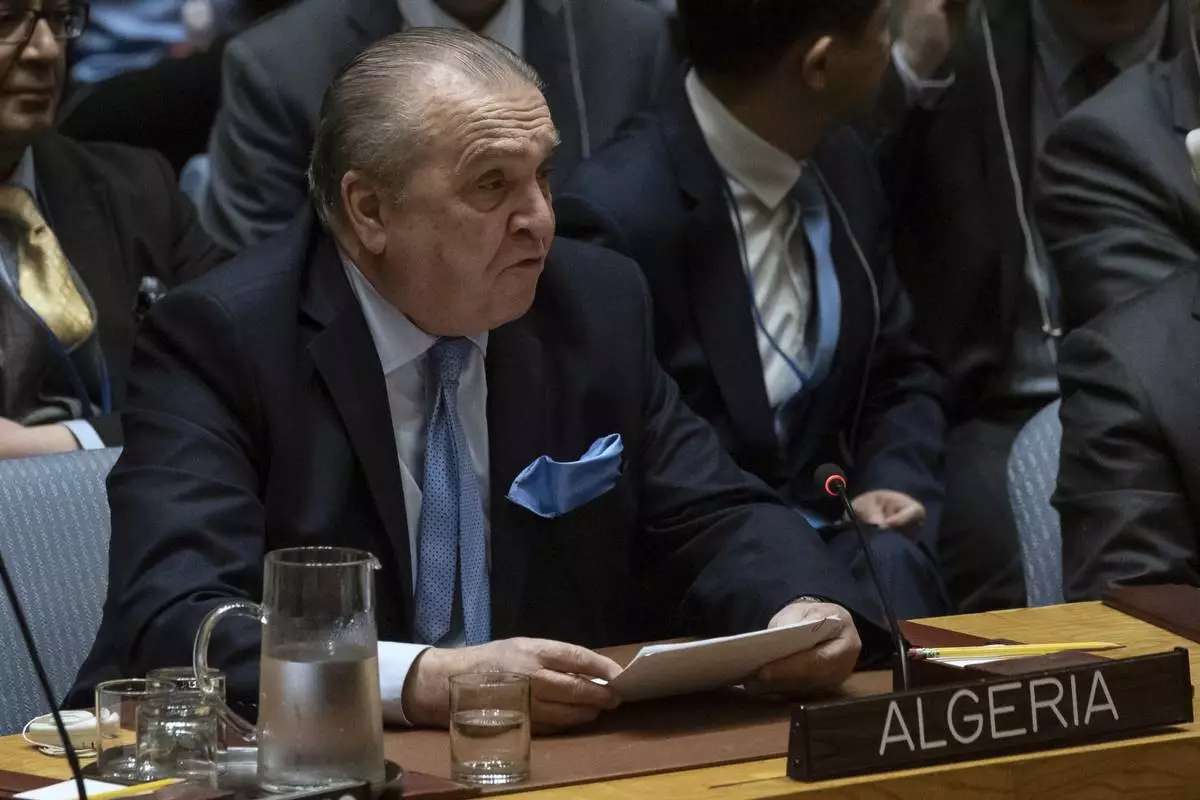
Algeria's Permanent Ambassador to the United Nations Amar Bendjama speaks during a Security Council meeting at United Nations headquarters, Thursday, April 18, 2024. (AP Photo/Yuki Iwamura)
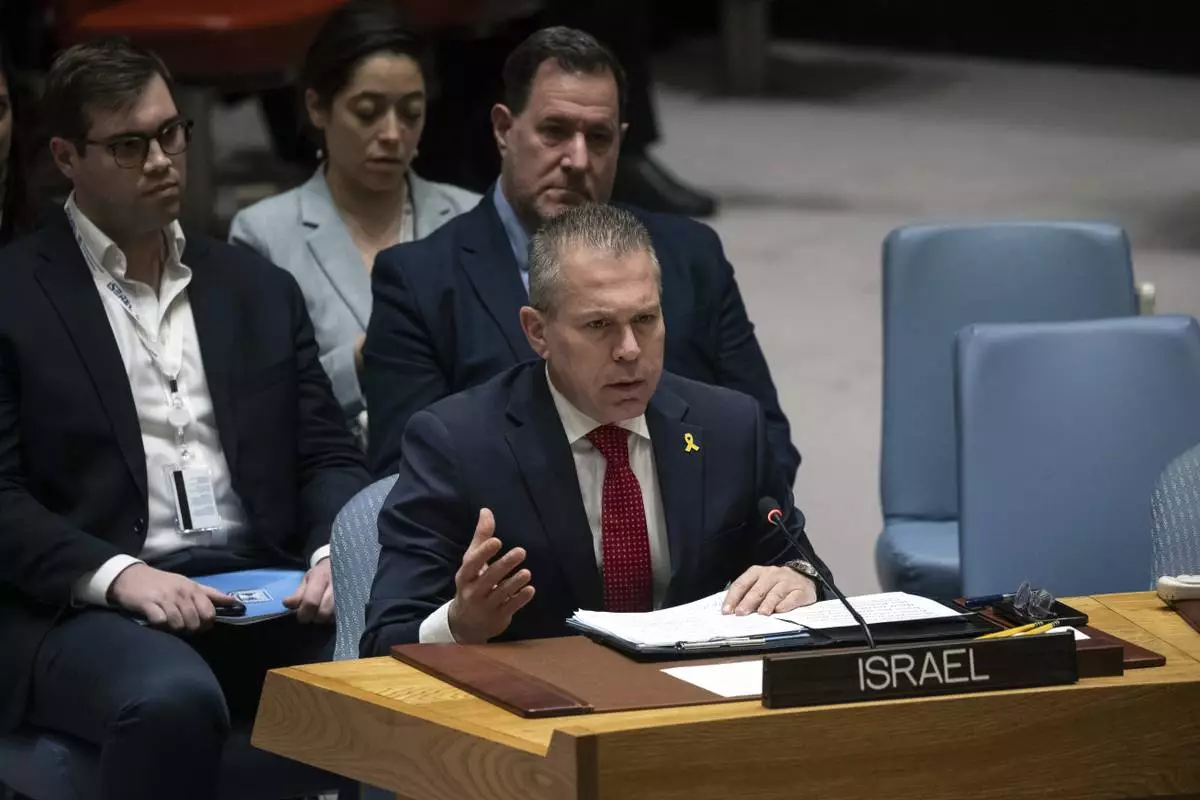
Israeli Ambassador to the United Nations Gilad Erdan speaks during a Security Council meeting at United Nations headquarters, Thursday, April 18, 2024. (AP Photo/Yuki Iwamura)
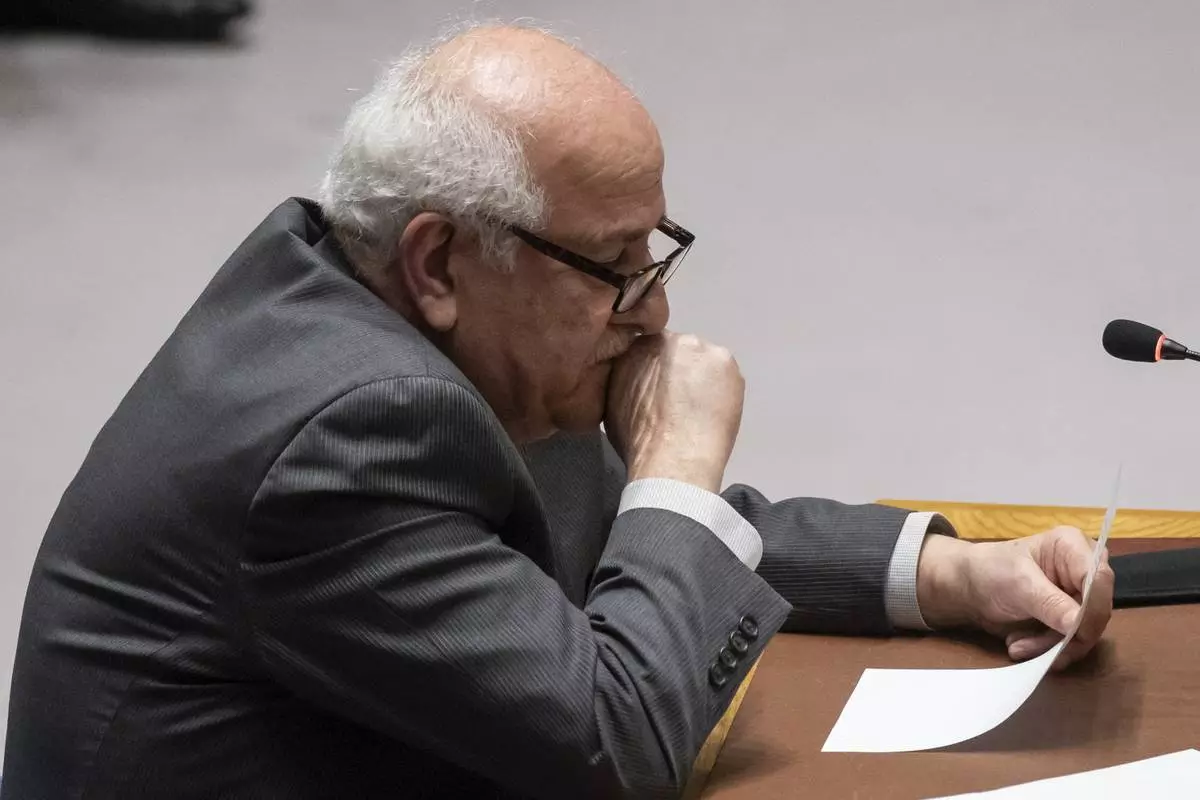
Palestinian Ambassador to the United Nations Riyad Mansour holds tears while speaking during a Security Council meeting at United Nations headquarters, Thursday, April 18, 2024. (AP Photo/Yuki Iwamura)
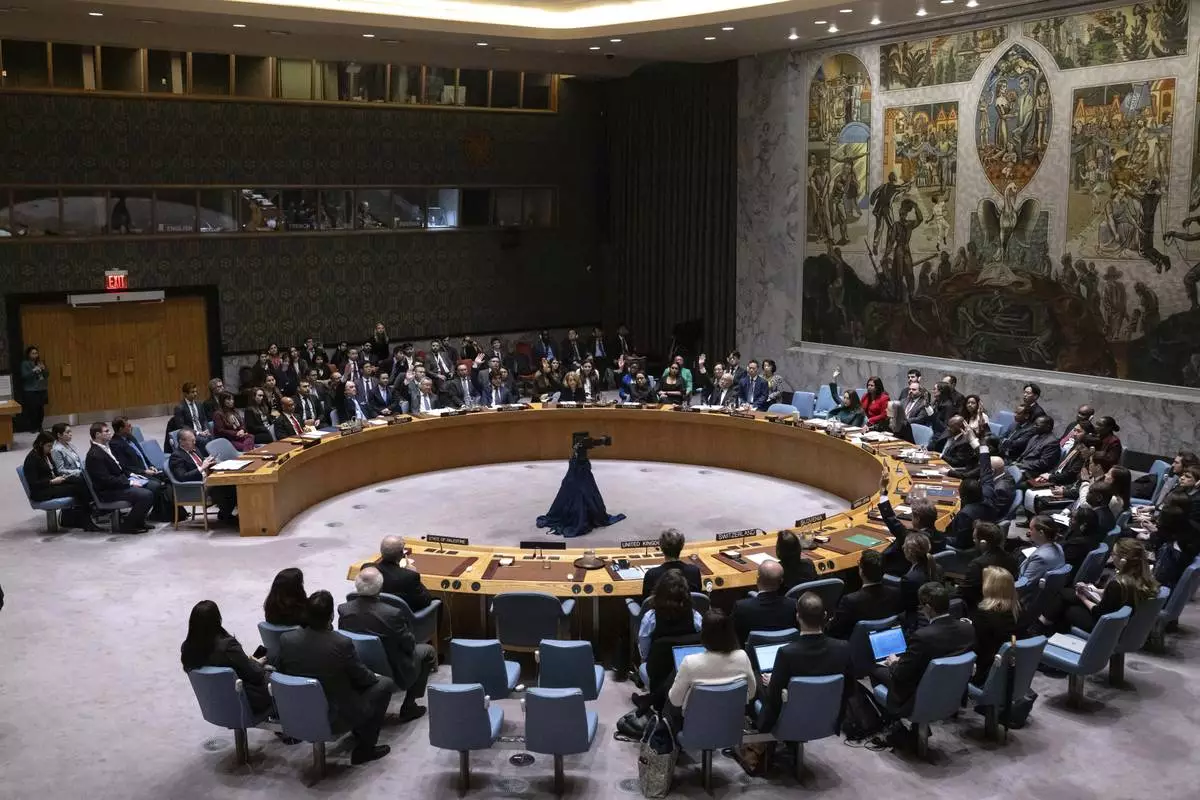
Representatives of member countries take votes during a Security Council meeting at United Nations headquarters, Thursday, April 18, 2024. (AP Photo/Yuki Iwamura)
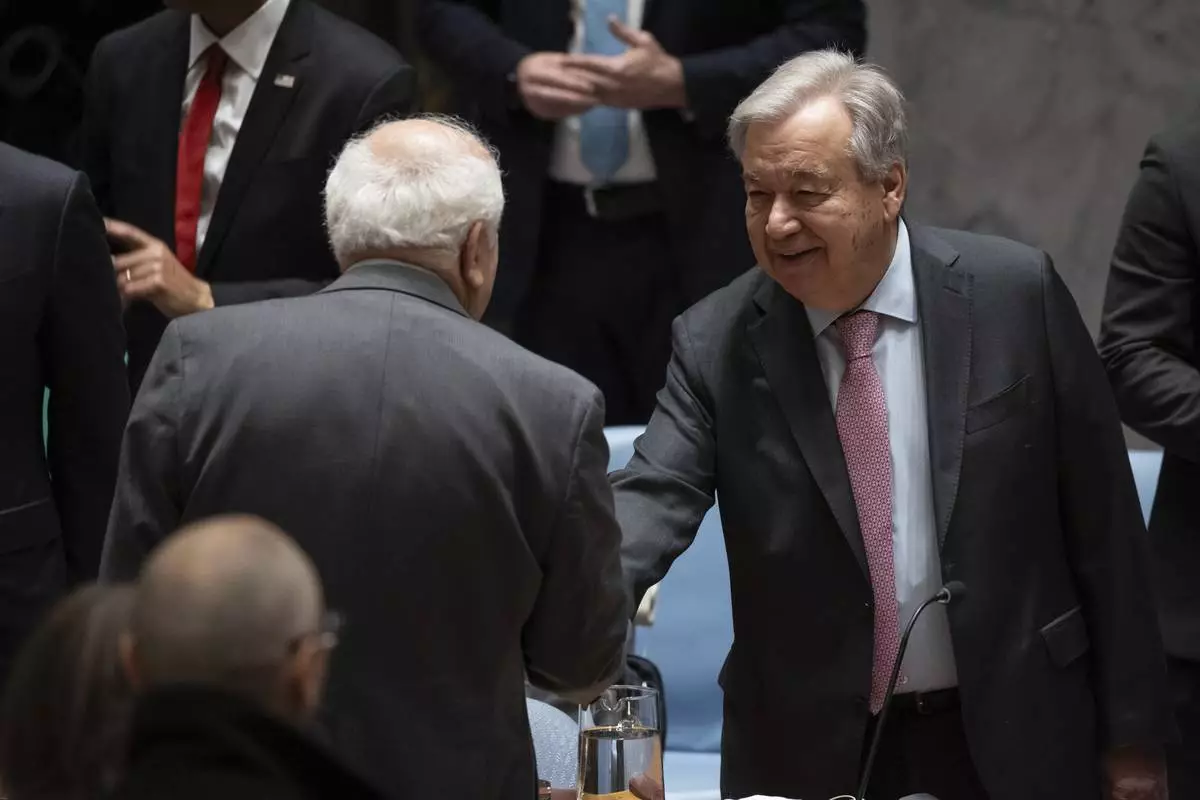
Palestinian Ambassador to the United Nations Riyad Mansour, left, and United Nations Secretary-General Antonio Guterres speak before a Security Council meeting at the United Nations headquarters, Thursday, April 18, 2024. (AP Photo/Yuki Iwamura)
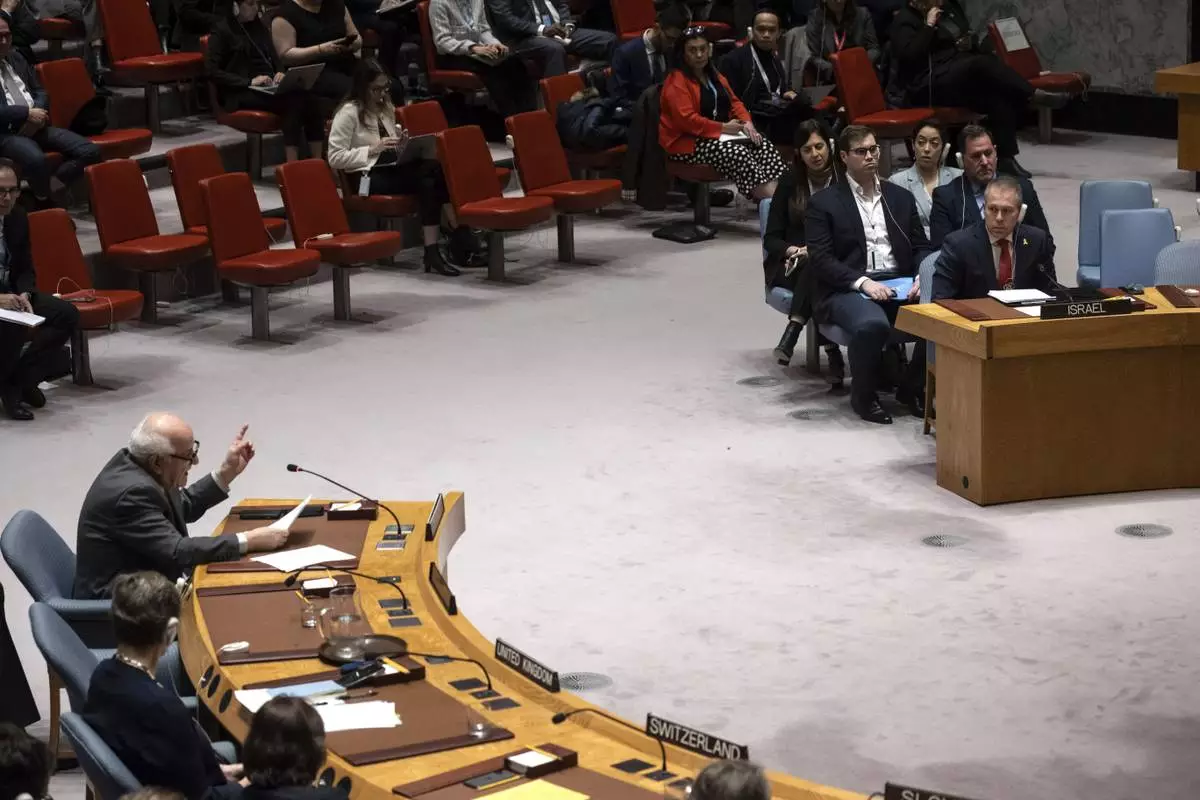
Palestinian Ambassador to the United Nations Riyad Mansour speaks during a Security Council meeting at United Nations headquarters, Thursday, April 18, 2024. (AP Photo/Yuki Iwamura)
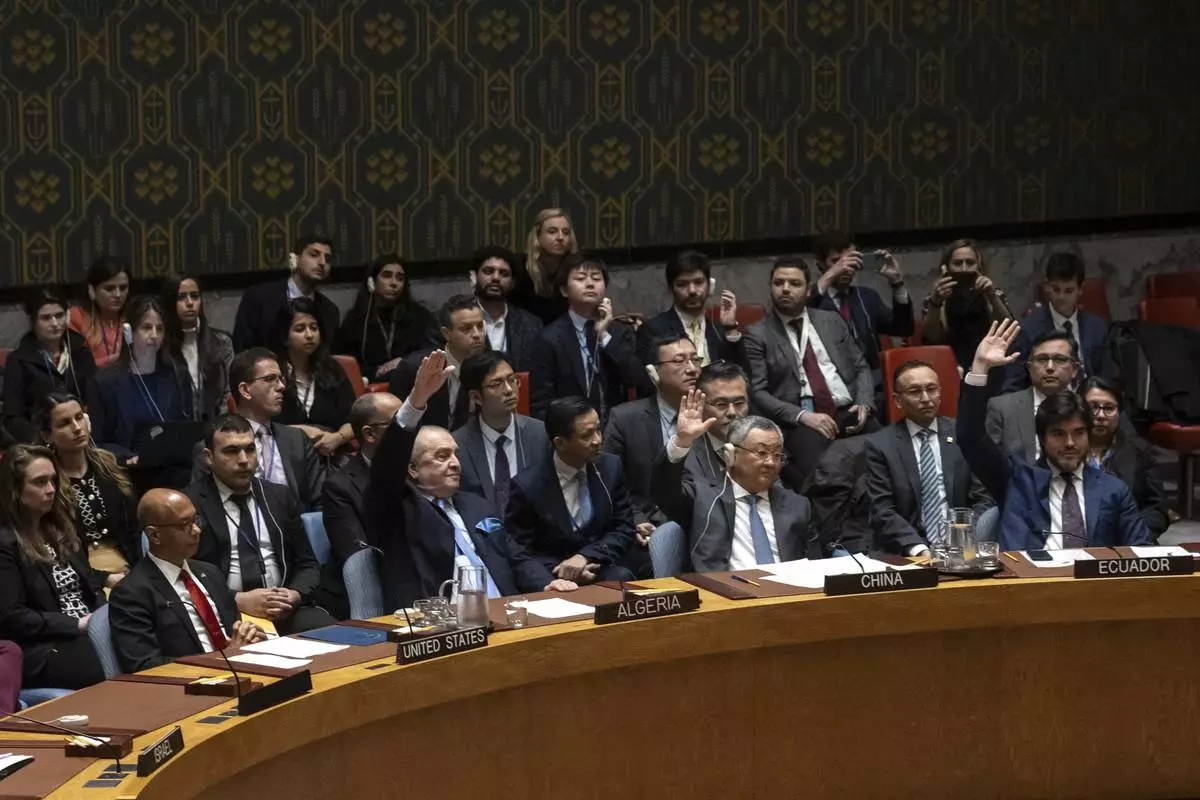
Representatives of member countries take votes during a Security Council meeting at United Nations headquarters, Thursday, April 18, 2024. (AP Photo/Yuki Iwamura)
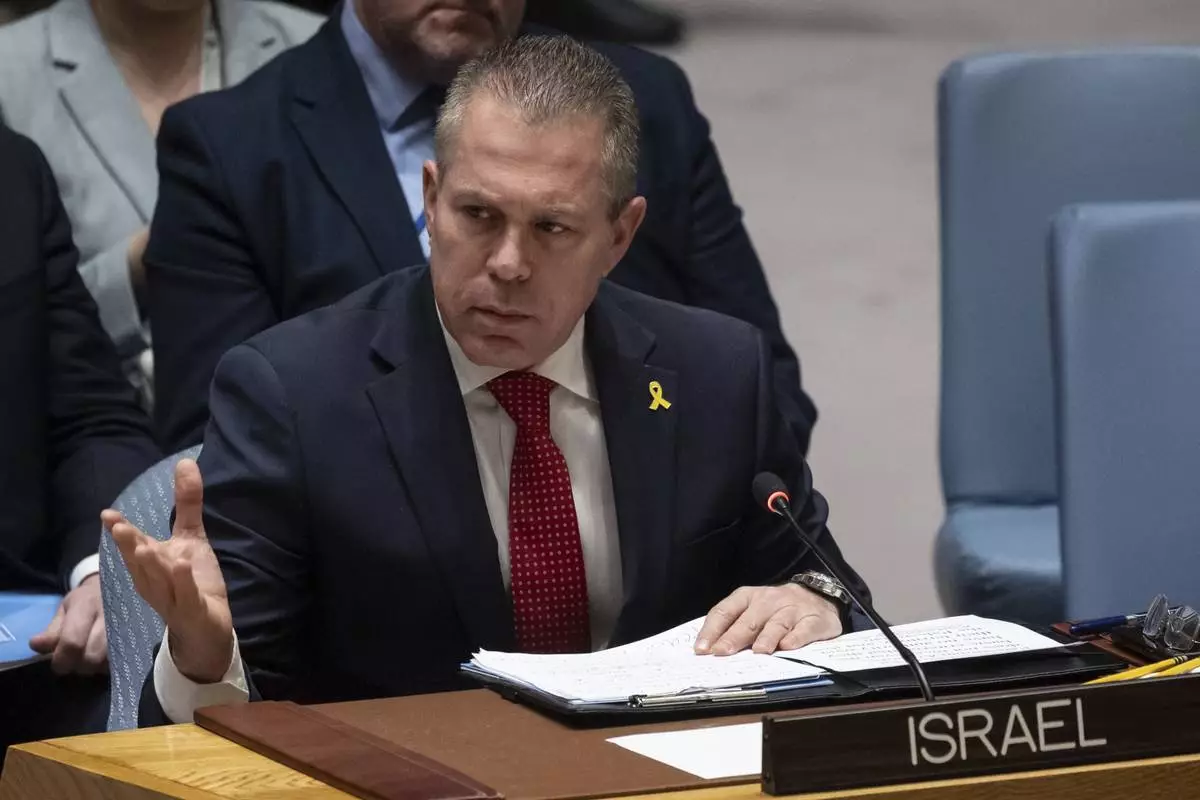
Israeli Ambassador to the United Nations Gilad Erdan speaks during a Security Council meeting at United Nations headquarters, Thursday, April 18, 2024. (AP Photo/Yuki Iwamura)
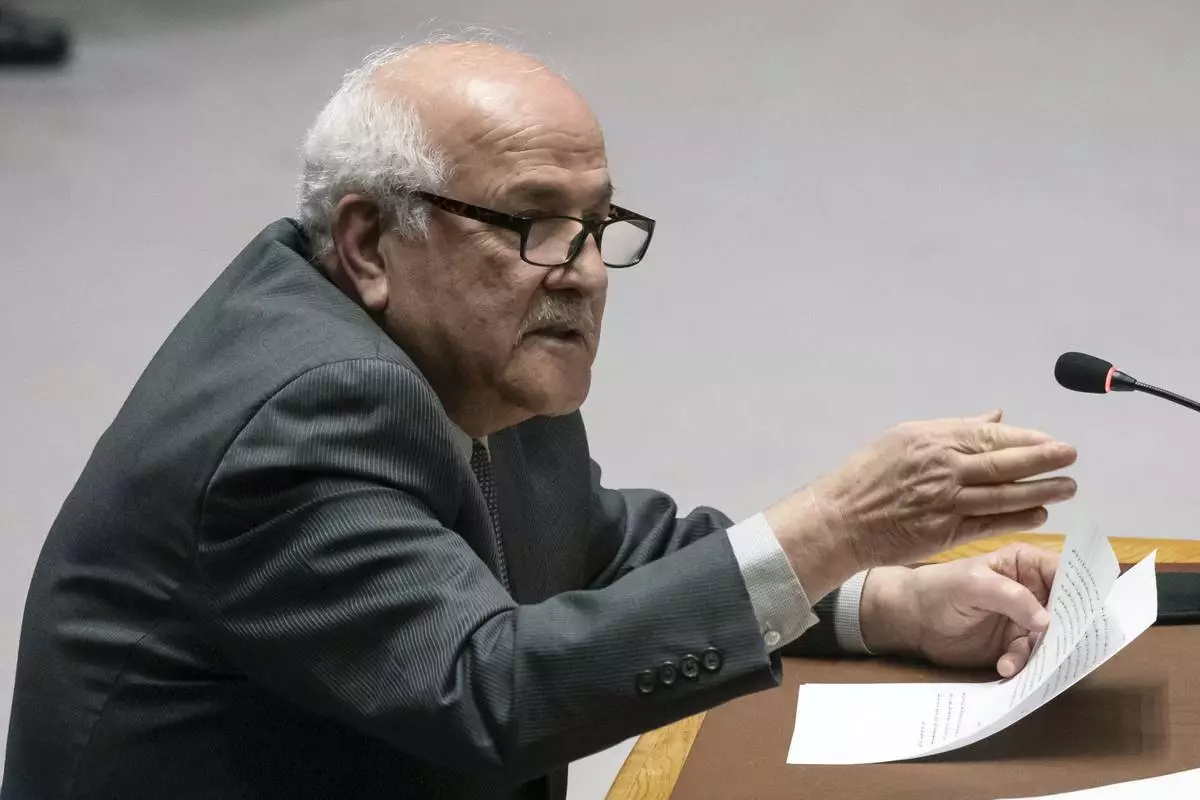
Palestinian Ambassador to the United Nations Riyad Mansour speaks during a Security Council meeting at United Nations headquarters, Thursday, April 18, 2024. (AP Photo/Yuki Iwamura)
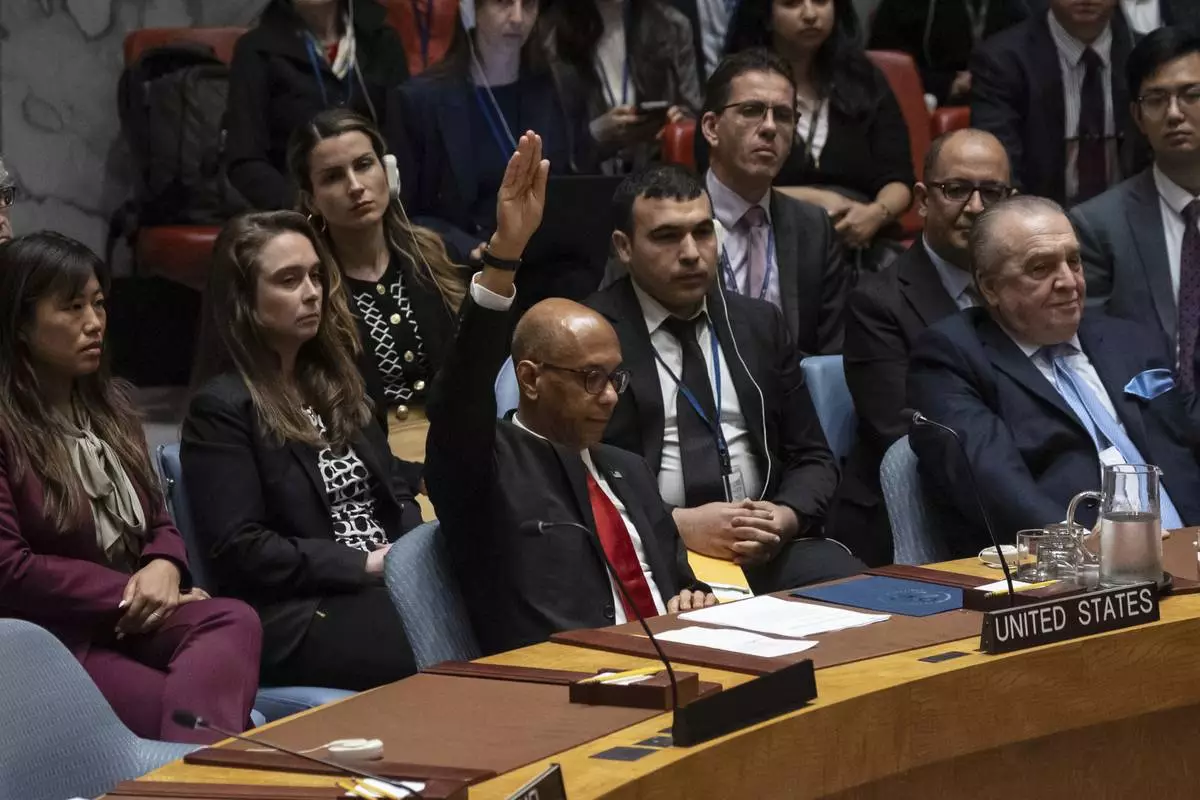
U.S. Deputy Ambassador Robert Wood votes against resolution during a Security Council meeting at United Nations headquarters, Thursday, April 18, 2024. (AP Photo/Yuki Iwamura)



















